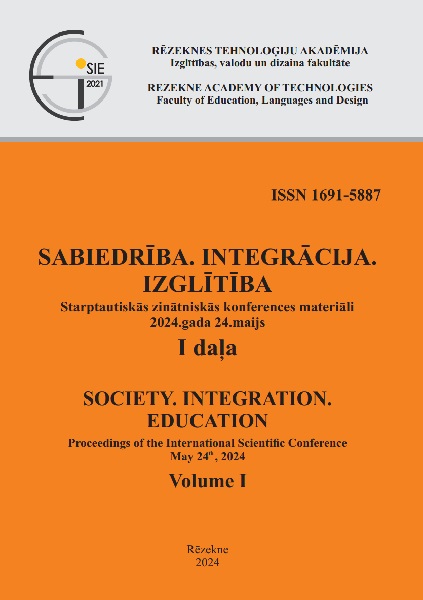MODELING THE PROCESS OF FORMING THE SKILLS AND PEDAGOGICAL ANALYSIS OF MUSICAL WORKS OF FUTURE MUSIC TEACHERS
DOI:
https://doi.org/10.17770/sie2024vol1.7831Keywords:
music teacher, model, musical activity, cognition, skill, artistic and pedagogical analysis, piano trainingAbstract
The article highlights the importance of the skills of artistic and pedagogical analysis of musical works for the success of piano training of music teachers. The purpose of the article is to analyze the process of modeling the skills of artistic and pedagogical analysis of musical works of future music teachers. The research used a set of methods: theoretical (analysis of scientific literature, theoretical modeling, comparison, generalization), empirical (observation, questionnaires, testing), methods of processing experimental data for the purpose of quantitative and qualitative analysis of diagnostic results. The content of the concepts: «skill», «skill of artistic-pedagogical analysis of musical works» is clarified, the purpose, task, essence, features and functions of artistic-pedagogical analysis are defined. A model of the formation of the skills of artistic and pedagogical analysis of musical works in the process of piano training has been developed, pedagogical conditions, principles and stages (cognitive-informational, value-orientational, independent-creative) of its implementation have been substantiated. The results of the empirical study showed that in the process of piano training of music teachers, the artistic and pedagogical analysis is not sufficiently updated. At individual lessons in the piano class, only its individual elements are used: biographical information, stylistic features and analogies, analysis of means of expression. Innovative technologies and methods (motivational, cognitive, interactive) of forming skills of artistic and pedagogical analysis are proposed. It has been proven that artistic and pedagogical analysis is a powerful and effective means of developing social skills (soft skills), as it allows students to be involved in various types of musical activities: artistic-cognitive, artistic-analytical, artistic-performing. The conducted research confirmed the relevance of artistic and pedagogical analysis in the process of piano training of music teachers.
References
Bondar, V. (1987). Managerial activity of the school principal: a didactic aspect. Kyiv: Rad.shkola
Beh, I. (2003). Personality education: In 2 books. Kyiv: Lybid
Goncharenko, S. (1997). Ukrainian pedagogical dictionary. Kyiv: Lybid
Maksimenko, S. (2004). General psychology: textbook. Vinnytsia: Nova Kniga
Ministry of Education and Science of Ukraine, (2014). Law of Ukraine on higher education. Retrieved from: http://pnpu.edu.ua/wp-content/uploads/2020/03/zakon_pro_vusosvitu.pdf
Ministry of Education and Science of Ukraine, (2022). Strategies for the development of higher education of Ukraine for 2022-2032. Retrieved from: https://zakon.rada.gov.ua/laws/show/286-2022-%D1%80#Text
Moskvichova, Y., Mozgalova, N., Shcholokova, O., & Baranovska, I., (2019). Historical Prerequisites for the Formation, Worldview, and Aesthetics of Romanticism: Specificity of the Ukrainian Model. Journal of History Culture and Art Research, 8(4), 300-312.
Mozgalova, N. (2011) Theoretical and methodological principles of instrumental and performance training of music teachers: monograph. Vinnytsia: «Mercury-Podillia»
Mozgalova, N., Baranovska, I., Hlazunova, I., Mikhalishen, A., & Kazmirchuk, N. (2021). Methodological foundations of soft skills of musical art teachers in pedagogical institutions of higher education. Linguistics and Culture Review, 5(S2), 317- 327.
Mozgalova, N., Baranovska, І., Zuziak, Т., Martyniuk, А., Luchenko, О., (2022). Professional training of music and choreography teachers: artistic-communicative context. Society. Integration. Education.Proceedings of the International Scientific Conference, 194-204
Novosadova, А., Novosadov, Y., (2022). A stylistic approach to the study of music-theoretical disciplines in the process of professional training of future teachers of musical art and choreography. Musical choreography and education in the context of cultural development of society, 123-125
Padalka, H. (2008) Art pedagogy: theory and methodology of teaching art disciplines. Kyiv: Education of Ukraine
Ostromensky, V. (1989) Artistic and pedagogical analysis of musical works. Kyiv: Musical Ukraine ROKEACH, M (1988). Rokeach Value Survey. Consulting Psychologists Press.
Rostovsky, O. (1997) Pedagogy of musical perception: educational and methodological manual. Kyiv: IZMN
Uspenskyi, V., Chernyavska, A., (2003). Introduction to psychological and pedagogical activity Retrieved from: http://medlit.pp.ua/23790_%D0%B2%D0%B2%D0%B5%D0%B4%D0%B5%D0%BD%D0%BD%D1%8F_%D0%B2_%D0%BF%D1%81%D0%B8%D1%85%D0%BE%D0%BB%D0%BE%D0%B3%D0%BE-%D0%BF%D0%B5%D0%B4%D0%B0%D0%B3%D0%BE%D0%B3%D1%96%D1%87%D0%BD%D1%83_%D0%B4%D1%96%D1%8F%D0%BB%D1%8C%D0%BD%D1%96%D1%81%D1%82%D1%8C_2_003.html
Shcholokova, О. (1996) Basics of professional artistic and aesthetic training of the future teacher: monograph. Kyiv
Vary, M. (2007). Psychology: teach pos. for students’ higher education institutions. Kyiv: Center for Educational Literature
Zamfir, K. (2021). The Methodology «Motivation of the professional activity». In the modification of A. Rean.
Zhang, Jie. (2014) Formation of skills of artistic and pedagogical analysis of musical works in the process of piano training of music teachers. Diss. cond ped science. Kyiv






